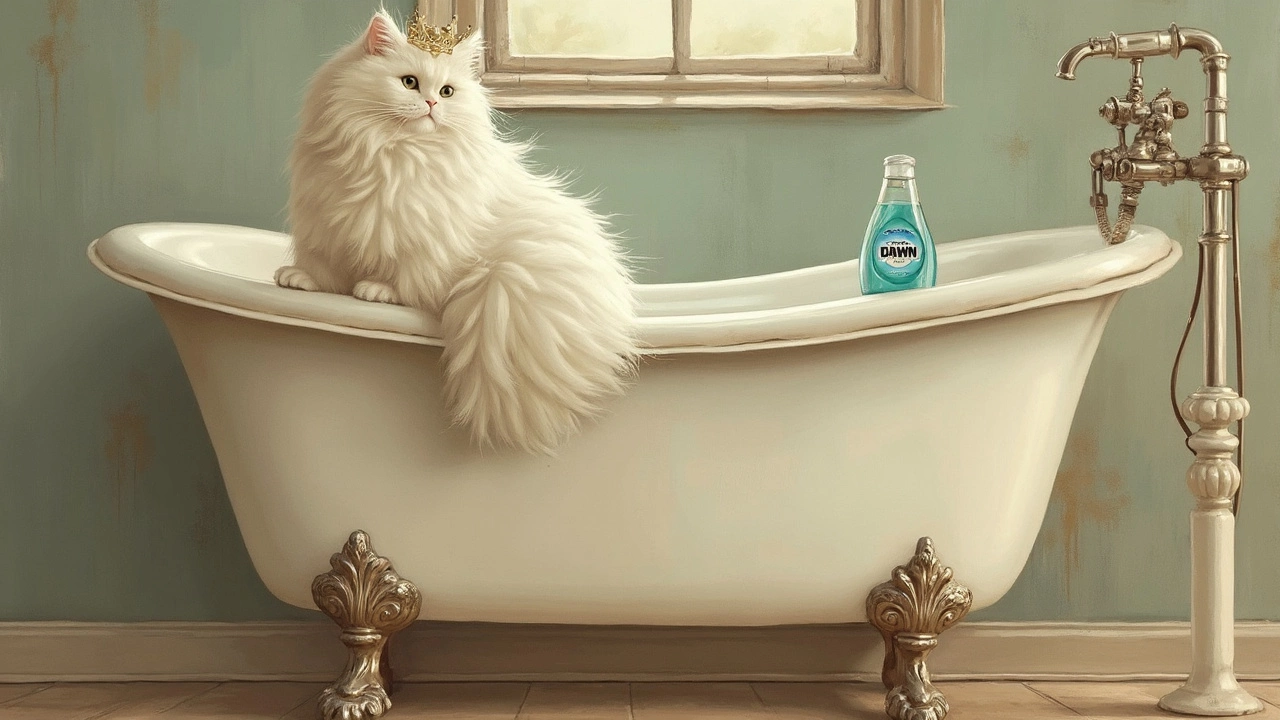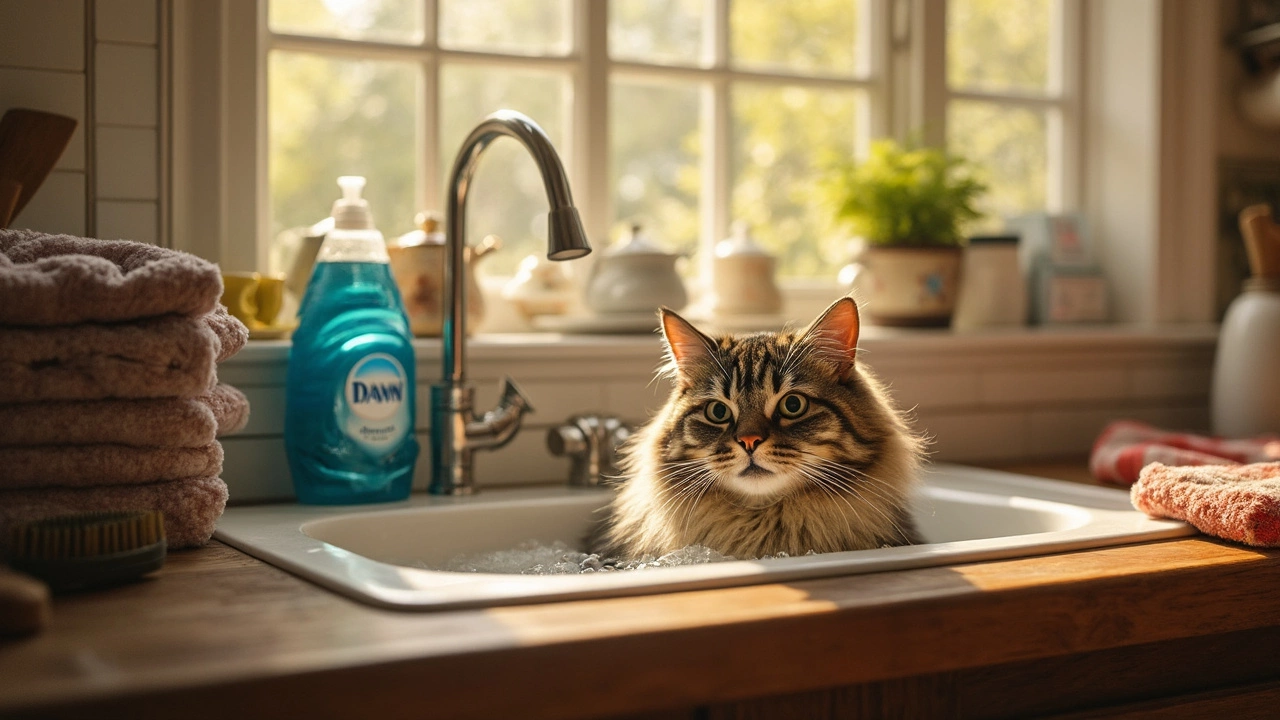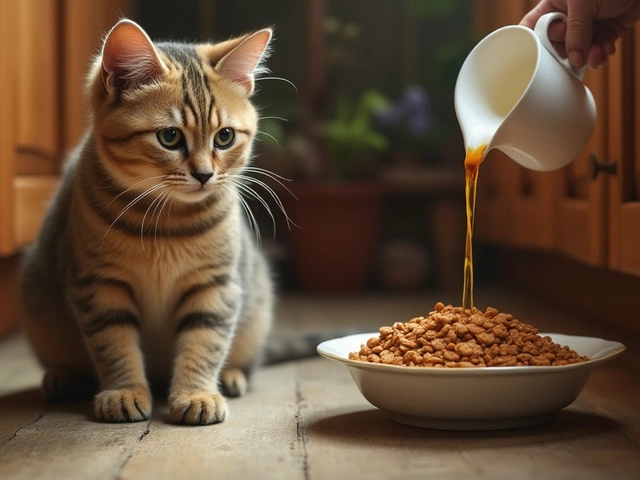So, you're wondering if you can use Dawn to wash your cat. It's a question a lot of pet owners have, especially since Dawn's pretty famous for cutting through grease and grime. And let's face it, cats can sometimes get into sticky situations.
The good news? Dawn has been used to clean up wildlife after oil spills, so it's clearly effective. But does that mean it's safe for your kitty? Not exactly the same situation, right?
In this article, we'll dive into what makes Dawn tick, and whether those same qualities make it good or bad for your feline friend. Stick around, because you'll also get some veterinarian insights and alternatives, in case Dawn turns out to be a no-go.
- Is Dawn Safe for Cats?
- The Science Behind Dawn's Ingredients
- Veterinarian Opinions
- Alternatives to Dawn for Cat Bathing
- How to Properly Wash Your Cat
- Tips for Stress-Free Cat Bathing
Is Dawn Safe for Cats?
Many pet owners find themselves reaching for a bottle of Dawn when their furry friend needs a wash. But before getting your cat all soapy, you might want to pause and consider a few important points.
The main thing to know is that while Dawn soap is famed for its effectiveness, especially in wildlife rescue cases, it isn't specifically formulated for pet care. It's super at breaking down oils, but it's also strong, which could potentially irritate your cat's skin, especially since felines have much more sensitive skin compared to humans.
Ingredient Breakdown
Understanding the ingredients in Dawn is crucial. It contains sodium lauryl sulfate, which is excellent for cutting grease, but this can dry out your cat's skin if used repeatedly. Cats have a lipid barrier that maintains skin hydration, and harsh soaps can strip this away.
Consider Your Cat's Health
Consider your cat’s current health status. Is your pet prone to skin issues or allergies? If yes, it’s better to err on the side of caution. Using Dawn might exacerbate existing conditions and worsen dry or itchy skin.
When Using Dawn Might Be Okay
In emergencies where your cat is covered in a harmful substance like oils or grease, a quick bath with a small amount of Dawn might be justifiable. In such cases, though, always ensure it’s thoroughly rinsed off to prevent ingestion during your cat's grooming rituals.
| Soap | Cat Safe? | Use Frequency |
|---|---|---|
| Dawn | Occasional/Emergency | Sparingly |
| Pet-Safe Shampoo | Yes | Regularly |
Ultimately, checking with your vet should be step one. They can offer advice tailored specifically to your cat's health needs and suggest appropriate alternatives to Dawn.
The Science Behind Dawn's Ingredients
Alright, let's talk chemistry for a second. Dawn soap's main job is to be an absolute beast in cutting through grease and grime. That's why it's super popular in kitchens and even in wildlife rescue operations. But how does it get the job done?
The main actors here are surfactants. These guys are the key ingredients that make Dawn so effective. Basically, they lower the surface tension of water, allowing it to mix with oils and dirt, breaking down the grease effectively. Makes sense why they’d use it in oil spills, right?
Key Ingredients to Be Aware Of
Here's what you should know when it comes to what’s actually in the bottle:
- Ammonium Laureth Sulfate: Often the primary surfactant, kind of like the lead singer of the band. It helps create foam and remove oils.
- Cocamidopropyl Betaine: Works to boost that foam, but also makes the soap milder, which is good news for sensitive skin.
- Fragrance and Dyes: These are what make Dawn smell great, but they're not necessary or always safe for pets.
Benefits and Risks
So, here's the kicker: while these surfactants are brilliant for scrubbing dishes, they may not be the best for your cat. Pet skin has different pH levels compared to humans, meaning human soaps can cause irritations or strip natural oils from your cat’s fur, leaving them uncomfortable.
Are There Any Alternatives?
If you're worried about potential reactions, it might be worth checking out pet-specific shampoos. Many are specially formulated to be gentle on a cat's sensitive skin. Plus, they don't contain unnecessary fragrance and dyes that could irritate.
Quick Ingredient Recap
| Ingredient | Function |
|---|---|
| Ammonium Laureth Sulfate | Main surfactant, helps remove oils |
| Cocamidopropyl Betaine | Foam booster, mildness agent |
| Fragrance/Dyes | Perfume enhancer, unnecessary for animals |
In short, understanding what's in Dawn soap can help you make informed decisions when it comes to your furry pal. Remember, choosing the right cleaning products is crucial for their health and happiness.
Veterinarian Opinions
It's no surprise that pet owners would turn to the experts when deciding what's best for their furry companions. Veterinarians often emphasize the safety and well-being of your pets, so what do they think about using Dawn on cats?
Most vets agree that while Dawn can be effective at removing grime, it's not really designed for our feline pals. Cats have sensitive skin with different pH levels compared to humans. So, using a product meant for dishes might throw off their natural balance, potentially leading to skin irritation or dryness.
What do the studies say?
A few studies have looked into the impact of household cleaning products on pets. One found that around 30% of cats developed mild skin issues after being washed with non-pet-specific products.
| Study | Outcome |
|---|---|
| Household Product Survey 2023 | 30% of pets had mild reactions |
That's not to say it's a total no-no. Some vets might suggest using Dawn in emergency situations, like if your cat gets into something oily or greasy. But even then, it should be thoroughly rinsed off to avoid any residue.
Alternatives Vets Recommend
For regular cleaning, vets typically recommend shampoos made specifically for cats. These products are made to suit your cat's unique skin and fur, reducing the risk of irritation.
- Look for products labeled as hypoallergenic.
- Avoid anything with fragrances or dyes.
- If in doubt, consult with your vet first.
By choosing products that are specially formulated for cats, you're ensuring that your pet's health remains top-notch.

Alternatives to Dawn for Cat Bathing
Looking for ways to keep your cat clean without reaching for the Dawn? You're in luck because there are quite a few cat-safe options out there. Here are some common alternatives that might fit the bill and keep your kitty's skin and fur in top shape.
Cat-Specific Shampoos
The safest bet is using shampoos that are specifically designed for cats. They're formulated to be gentle on a cat's skin and won't strip away those natural oils. Check out options labeled as hypoallergenic if your cat has sensitive skin.
Waterless Cat Shampoos
For the cats who dread water (and let's be real, that's most of them), waterless shampoos are a lifesaver. These come as foams or sprays you can apply directly to your cat's fur and then just wipe off with a towel. Benefits? Less mess and usually less stress for the both of you.
Oatmeal and Aloe Shampoos
If your feline friend has itchy or dry skin, shampoos with ingredients like oatmeal or aloe vera can be soothing. They help to moisturize the skin naturally, without any harsh chemicals.
Baking Soda
As a natural deodorizer, baking soda is great for a quick freshen-up. Simply sprinkle, brush it through their fur, and voilà! Just remember, it's not meant for a deep clean but works if you’re in a pinch.
Baby Shampoo
In a bind and don’t have any pet-specific options? Baby shampoos can do the job because they're generally mild and won't upset your cat's skin. But, it's more of an occasional fix rather than a go-to method.
So, while Dawn might have its uses, it’s always better to go with something tried and tested for animals. Your feline buddy will thank you for it!
How to Properly Wash Your Cat
First off, take a deep breath. Bathing a cat can seem as daunting as climbing Everest, but with the right approach, it can be stress-free for both you and your feline friend. The trick is preparation and patience.
Gather Your Supplies
Before you even think about getting kitty wet, make sure you've got everything you need at hand. This includes:
- Towels – plenty of them, trust me.
- A cat-safe shampoo – if Dawn isn’t the choice, make sure it's something made for cats.
- Cotton balls – to gently clean around their ears.
- A cup or a spray nozzle – for gentle rinsing.
Staging the Area
Set up your bath area. It's best to use a sink or a small bathtub. Make sure the room is warm to prevent your cat from getting a chill.
Line the sink or tub with a towel to prevent slipping, and fill it with just a few inches of lukewarm water. Cats are not fans of water, so having a solid but shallow base helps keep them calm.
The Bathing Process
- Introduce Them to Water Slowly: Ease your cat into the water feet first. Remember, patience is key.
- Wet and Lather: Use the cup or nozzle to gently wet your cat's fur. Be careful to avoid their face.
- Apply Shampoo: Add a small amount of cat-safe shampoo to your hands and gently massage it into their fur.
- Rinse Thoroughly: It's critical to rinse all the soap out. Leftover shampoo can irritate their skin.
- Dry Off: Wrap your cat in a towel and gently pat them dry. If they'll allow it, you can use a blow dryer on a low setting.
Keep Calm and Carry On
Throughout the process, talk to your cat in soothing tones. If they start to struggle, pause and give them a bit of love before continuing. Remember, a treat afterward goes a long way in making the experience feel positive.
In a pinch, some owners keep a cat grooming tool, like a deshedding brush, nearby to handle any loose fur post-bath. A final brush-out often proves soothing.
There you have it, your guide to washing your cat with minimal fuss! Remember, regular grooming can reduce how often these baths need to happen, keeping both you and your feline happy.
Tips for Stress-Free Cat Bathing
Bathing a cat isn’t anyone’s idea of a fun afternoon, but sometimes it’s necessary. The trick is to make it as stress-free as possible for both you and your feline friend. Let's get into some simple strategies.
Prepare the Bathtub or Sink
Before your cat even knows what’s coming, set up everything you need. Use a non-slip mat so your cat doesn’t slide around. Fill the tub or sink with a few inches of lukewarm water—it should never be too hot or too cold.
Have Your Supplies Ready
Make sure you have pet-friendly shampoo ready—never use regular human stuff. Remember, cats have sensitive skin, and using the right product is crucial. Dawn might be an option, but verify its safety with your vet first.
Keep Calm and Carry On
Your cat will pick up on your energy, so talk softly and move slowly. Sudden moves or loud noises can freak them out, making the bath way harder than it needs to be.
Rinse and Repeat
When it’s time to rinse, make sure all the soap is completely washed out. Leftover residue can irritate your cat’s skin and lead to unnecessary scratching.
Dry Your Cat Thoroughly
Use a large towel to wrap your cat up like a burrito and gently pat them dry. Some cats might tolerate a hairdryer, but only if it’s on a cool setting and low speed. Never point it directly at their face.
Rewards and Treats
Once you’re done, give your cat some treats or a favorite toy. Positive reinforcement can make future baths less daunting for both of you.
If you follow these tips, washing your cat doesn’t have to be a nightmare. It takes a bit of prep and patience, but it’s doable!







